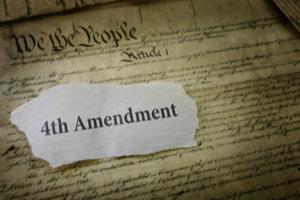How Do Fourth Amendment Rights Apply to Digital Evidence?
 The Fourth Amendment to the U.S. Constitution states that all citizens have the right to be free from unreasonable searches and seizures by the government without a warrant. This provides protection against unfair tactics by prosecutors when a person is facing criminal charges. However, in the 21st century, the increased use of digital media has resulted in a slew of complexities in criminal cases. The Fourth Amendment was written to protect the privacy of American citizens, but what happens when your private digital files are no longer private to only you? In some cases, the "private search doctrine" may apply.
The Fourth Amendment to the U.S. Constitution states that all citizens have the right to be free from unreasonable searches and seizures by the government without a warrant. This provides protection against unfair tactics by prosecutors when a person is facing criminal charges. However, in the 21st century, the increased use of digital media has resulted in a slew of complexities in criminal cases. The Fourth Amendment was written to protect the privacy of American citizens, but what happens when your private digital files are no longer private to only you? In some cases, the "private search doctrine" may apply.
What Is the Private Search Doctrine?
Using the private search doctrine, once a private party (who is not involved with the government) has already done an initial search, the government can repeat that search without infringing upon the property owner’s individual Fourth Amendment rights. Basically, the private search doctrine allows the government to perform a search that is not technically a search in the Constitutional sense.
A Recent North Carolina Case Sparks Controversy
In 2014, a North Carolina woman was looking for a photograph on her boyfriend’s USB thumb drive. While she was clicking through folders and subfolders on the drive, she came across a partially-nude photo of her nine-year-old granddaughter. Upset, she stopped her search and informed her daughter of the photo. The pair took the thumb drive to the police station, where a detective began to look through the folders to find the photo the woman was referring to. While the detective was looking, he saw other photos that he thought might be child pornography. Once he found the photo of the woman’s granddaughter, he stopped his search and obtained a warrant to search the thumb drive for photos of child pornography.
Charges were filed against the woman’s boyfriend. He argued that the warrantless search of his thumb drive violated his Fourth Amendment rights, but the trial court admitted the evidence uncovered by the police officer and ultimately ended up convicting him. The case went to the appeals court, which overturned the conviction on the grounds of violating the Fourth Amendment. The state brought the case to the North Carolina Supreme Court, which ruled that the search was unconstitutional.
When Is a Search a Search?
With the issue being so controversial, this case may soon end up in the United States Supreme Court for a final ruling on whether or not the search in question actually violated the Fourth Amendment. The private search doctrine states that a government "search" is not actually a search if the unit being searched has already been viewed by a private individual. In these cases, the question becomes, "What is the unit being searched?" Is the "unit" the thumb drive itself, or does it refer to a folder or subfolder within the thumb drive?
In the North Carolina case, the detective did not seek to find other evidence of child pornography on the man’s thumb drive, and he stopped his search after he found the photo in question. However, there was no telling whether the folders and subfolders that he looked through during his search were the folders and subfolders that the woman also opened when she found the photograph in question. The question of whether the photos found are admissible as evidence in court may play a significant role in these types of cases going forward.
Contact a Hartford, CT Criminal Defense Lawyer Today
Applying Constitutional rights to criminal cases can be tricky in today’s world. At the Woolf & Ross Law Firm, LLC, we understand the complexities involved in these types of cases, and we fight to protect the rights of clients who are facing criminal charges. If you have been charged with a crime, and your case involves digital evidence, you need to contact our skilled Connecticut criminal law attorney today. Call our office at 860-290-8690 to schedule a free consultation.
Sources:
https://reason.com/2019/08/23/north-carolina-court-deepens-split-on-private-searches-of-digital-evidence/
https://www.yalelawjournal.org/forum/the-private-search-doctrine-after-jones
https://orinkerrblog2.files.wordpress.com/2019/08/55a18-1.pdf






